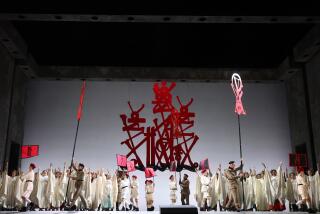Dada Shows a Live Spark
- Share via
SAN JUAN CAPISTRANO — Dada is a good band in a tough spot. The ‘60s-based pop-rock that the Los Angeles trio plays is a difficult--though not impossible--sell in this era when neo-metal, punk and updated late-’70s New Wave command the biggest rock audiences.
Getting younger kids excited about the sort of music their parents grew up with has always been a dubious task in our post-traditional society. And getting masses of thirtysomethings and fortysomethings to tune in to new stuff instead of hunting up the latest Eric Clapton or Sting CD is also a daunting prospect.
Dada hasn’t found the key yet.
As it wound up its touring for its latest release, “El Subliminoso,” Friday night at the Coach House, the band was ending on a less-than-triumphant note. After a commercially solid debut in 1992, keyed by the semi-novelty hit, “Dizz Nee Land,” Dada has misfired commercially.
At the Coach House, where Dada always packs the room with enthusiastic fans, guitarist Michael Gurley remarked repeatedly how preferable this show was to one Dada played recently in Alabama, where the handful of onlookers were more interested in the action at the pool table than the stage.
It was tough luck that Dada’s 1994 sophomore effort, “American Highway Flower,” backslid from the promising sales mark of about 300,000 the group reached with its debut, “Puzzle.” But moody, ‘60s-based pure-pop albums, which the well-written “Flower” was, are an even tougher sell than bright, immediately catchy ones such as “Puzzle.”
With “El Subliminoso,” Dada has undermined its own cause by turning out a so-so album in which the songwriting is much less crisp, and the psychedelic indulgences far more marked, than on the first two.
In concert, though, the band’s considerable strengths prevailed. Dada’s versatility allowed it to frame a 100-minute performance in which its prevailing ironic stance was balanced by such plaintive first-album gems as “Dim,” “Surround” and “Moon,” and by dark, noir-flavored mysteries including the second-album cut, “Ask the Dust.” The ballad, “Scum,” and a climactic, epic reading of “Dizz Nee Land” combined sardonic and yearning elements in a nice, emotionally conflicted mix.
Mostly, though, a Dada concert is about the sheer vocal and instrumental firepower of an immensely talented trio (abetted, for most of the show, by the rhythm guitar of Gurley’s younger brother, Gig).
*
In Dada, Gurley is the first among equals. He is perhaps the finest new rock guitarist to have arrived in this decade. His playing was prolific but tasteful, marked by shifts in dynamics and texture that kept things unpredictable.
Wailing through a wah-wah effect, chopping out funky chords, or finger-picking liquid runs, Gurley was a commanding, substantive player, his versatility and taste marking him as a more profuse heir to the Rolling Stones’ Mick Taylor.
He also is an eminently watch-able player, tucked under a hat in the Stevie Ray Vaughan tradition, moving with sashaying ease as he played, and fixing the distance with a gunfighter’s intent gaze while he soloed.
*
Where Gurley was a lithe athlete of a performer, bassist Joie Calio came off as a solid, hard-working yeoman. He held his ground, pumping his head to the beat until sweat flew off his dark and curly mane like water from a dirty mop.
The harmony blend between Calio’s clear, throaty tones and Gurley’s reedier singing clicked at every turn--not a Beatles rehash but a sound of their own.
Drummer Phil Leavitt gave the band a supple and powerful foundation. His mighty marching churn and light cymbal work helped guide “Dizz Nee Land” through a long, episodic journey that not only made the hit fresh but blew away the slight taint of gimmickry it acquires in using the “I’m going to Disneyland” ad slogan as a sardonic refrain.
When it was over, and the others had left the stage, Calio added a coda with some primitive fuzz-tone bass riffing--an act of defiance by a player with some career frustrations to get out, and a determination not to go quietly. “See you next time,” he told the cheering crowd.
If Dada can return with an album full of tightly written, expertly performed pure-pop delights that seems within its reach, maybe its next Coach House triumph will be one in which Gurley can tell stories about having triumphed in Alabama as well.
*
Dada brought an unadvertised, handpicked support act, the Vancouver band Deep Julia. It featured a singer whose phrasing betrayed a Chrissie Hynde fixation and three other players with a penchant for Led Zeppelin-like mystic moods.
The songs were practically tuneless, the lyrics prosaic and the lead guitar a dissonant waste of effort, especially given the band’s desperate need for melodic nourishment.
The Orange County band Nine Days’ Wonder opened and fought a murky sound mix.
Some gambits worked--notably the acoustic-electric guitar blend used early in the set. But the melodies and vocals were commonplace, a disappointment given the solid quality of the band’s demo tape.
More to Read
The biggest entertainment stories
Get our big stories about Hollywood, film, television, music, arts, culture and more right in your inbox as soon as they publish.
You may occasionally receive promotional content from the Los Angeles Times.









